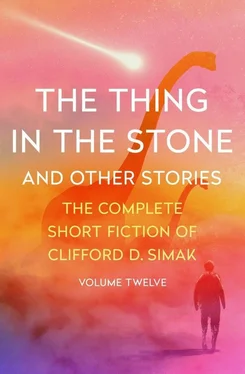Second-class citizen? asked the voice and it seemed that he was rolling from the darkness, not walking from it, but rolling from it. And it seemed instead of rolling that he was scuttling, moving furtively, afraid of being seen, shrinking from the ridicule if he should be seen, knowing that in this human world he could not be human who had been human once. Although it seemed strange that he should feel this way, for the very ones who scorned him and reviled him in some later day might become as he.
Dead conservatism? Asked the voice in the darkness and when the voice spoke he was no longer rolling, but was huddled in the darkness—a huddled machine among many other huddling machines and as he huddled there he heard the mumblings of his fellows and while he could not make out the words he knew what they said and from this he knew that they were huddling not only in the darkness, but in the past as well. There were the huddling machines, but there were others that were not machines, but rather immobile brains sitting in rows upon the shelves that stretched up and down this place wherein he huddled and these shelved brains seemed more content than those that had the bodies.
Death in life? the voice asked and when the voice stopped another voice spoke, a low and husky voice that belonged to the machine standing close beside him. Humanness, it said to him and all the others there, is not the matter of the mind alone, of the intellect alone. It is, as well, a matter of the body, of the women that we loved or the men we loved, of the things we ate, of lying on a hillside and feeling the earth beneath us and seeing the top branches of a great oak tree against the cloud-flecked sky, the feel of flesh on flesh when we shook hands with a friend, the smell of evergreen at Christmas, the glories of the lilies in the Eastertide… The low, husky voice went on and on, but he no longer heard it; he had shut his ears against it. it was saying all he felt and he did not need to hear and he did not wish to hear.
But would it be that way? Need it be that way? Why must these old bogeys rise? Could not humans accept their roboticized members, not as bogeymen, not as aliens, not as harsh reminders of what the future held for each of them, but as a metamorphosis, another way of human life, the only way of human life, if these were to be survival? It was either that or death. Surely, on the face of it, anything was preferable to death. Not that death, in itself, was bad, but it was oblivion, an emptiness, an ending and a nothingness and certainly man had a right to expect something more than nothingness.
Unless, he thought—unless there could be something to an afterlife. What if persisting as a human intellect should rob a man of an afterlife? But there was, he thought, no evidence, no evidence at all, that there was such a thing as afterlife. And the thought brought a clamor in his mind—a quarreling clamor from all those others with him.
When the clamor died down, he tried to think again. Perhaps, then, the thing to do was to investigate the theory of an afterlife. But how would one do that? How could one go about it? What kind of investigative process should one use, how could one evaluate the data, how could one be sure the principles applied to that evaluation would be valid?
He reached up and tore off the headset, thumbed the console back to deadness. What was the use, he thought. How could one be ever really sure?
He rose, shaken, from the chair, and went back to the living room. He stood before the window, but now there was nothing he could see. Clouds had moved in far below him and masked the landscape.
“A drink, sir?” asked Harley. “I think you need a drink.”
“I think I do,” said Harrison. “Thank you very much.”
The liquor dispenser did not ask. It knew exactly what he wanted. He picked up the drink and turned back to the window.
It made no sense, he knew. It was all old prejudice and bias. Man had the right to expect a shot at immortality, if it were possible. And it was possible. Perhaps not in exactly the form that one might want it, but it was available. It was there and could be had.
The wastefulness, he thought, the utter wastefulness of death. If for no other reason, immortality would recommend itself on economic grounds. But no matter what might be decided, the old objections would still persist; they never went away. If he had stayed longer at the console, the favorable opinions would have wiped away and set at naught all but a tiny nagging doubt that would hang on forever. There was little use, he told himself, in returning to the console. The pattern had been set and it would not change.
He had gone, he knew, as far as he could go.
He went back into his workroom and sat down, not in the console chair, but behind his desk.
“Harley,” he said, “please get me Univac.”
“Surely, sir,” said Harley.
In front of him a shimmer came, that shimmer no amount of work and research ever could get rid of, and the face was there. No body, as would have been the case if it had been a human, but just a face hanging in the air. It could as easily have been a human face, with body, Harrison reminded himself, a human simulation of the mighty system that was, in fact, the city, but the system itself had not gone along with that. “Let us be honest,” it had said and it still was honest—not a human, but a system. And in accord with that it was not a human face that stared across the desk at him, but a strangely mechanistic face, the sort of face that an artist, full of artistic cynicism, might have conjured up to represent the system.
“Mr. Harrison,” said Univac, “how good to see you once again.”
“It is good to see you, too,” said Harrison. “You recall, perhaps, that I spoke with you some time ago about a project I was working on.”
“Yes, of course,” said Univac. “Immortality. How is it getting on?”
“It can be done,” said Harrison. “A human mind can be imprinted. I am sure of that.”
“What does the computation say?”
“It says we can imprint. With no loss. No aberration. A human mind can be transferred intact.”
“And be effective?”
“Entirely effective. There may be, eventually, some emotional loss. We can’t be sure.”
“Mr. Harrison, if that should happen, how important would it be?”
“Immensely important from the human viewpoint, perhaps. Although it might make the mind the more efficient, we are not, of course, entirely sure it would come about.”
“You, of course, have done exhaustive simulation?”
“Yes,” said Harrison, “exhaustive. That’s what bothers me. It works out. There would be a period of social adjustment, certainly. At first, perhaps not all the people would wish the transfer. There might always be some who would shrink from it, although, as time went, there would be fewer of them. Perhaps the time would come when it would be accepted as a normal course of human life, a normal event in the life of any man. It might take some time for the public to accept the actual presence of robotic humans—not robots, but humans in robotic form—but that, in time, I am sure, would work itself out. Humanity would gain by it. We would be the richer by each human mind that could be saved from death. Our brainpower would increase, with no great additional drain on our natural resources.”
“What is your problem, then?” asked Univac.
“A nagging doubt,” said Harrison. “One that hangs in there and will not go away. Based on certain objections that have no real logic in them. They can be explained away, but they stay. It is, I suppose, a matter of human intuition, if not human judgment. I hate to go against human intuition.”
“So would I,” said the face that was Univac.
“What do we do, in such a case? Wait another century, with men dying all the time, to make up our minds?”
Читать дальше












